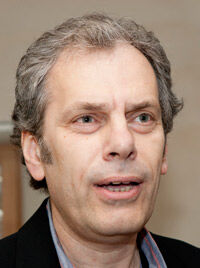University News Last updated 17 May 2012

Policy-makers looking to safeguard millions of homes and businesses from spiralling fuel costs are told to turn to ground-breaking research from Birmingham City University.
Dr Lubo Jankovic from Birmingham City University has revealed his latest research which lays the foundation for universal zero carbon living at a special event hosted in the pioneering Birmingham Zero Carbon House.
“I’m proud that this pioneering work on the zero carbon living has emerged in Birmingham,” said host Roger Godsiff, MP for Birmingham Hall Green. He added that the work – which will help deliver zero carbon living to any home, from a Victorian terrace to a mansion – has the potential to give more edge to current Government initiatives, such as the Green Deal.
Dr Jankovic, from the University’s prestigious school of architecture, said: “Birmingham has been leading the way in its response to the climatic challenges that lie ahead – and Birmingham City University has been a committed partner, providing the research to help make the ideas a reality.
“We look forward to continuing this work and ensuring the city retains it eco-leadership because this work is crucial to improving the quality of life for millions of people, as well as having the potential to create new jobs as part of a sustainable economy.”
Dr Jankovic says his research will help inspire policy-makers to overcome the huge challenges to make all kinds of homes carbon zero - and ultimately more cost effective.
His call for action coincides with the publication of his latest research in a book entitled: 'Designing Zero Carbon Buildings Using Dynamic Simulation Methods'. Part of his research has been based on the work done to evaluate the, a ground-breaking carbon-neutral building based on 170-year-old redbrick Victorian house.

The launch event at the Zero Carbon House
Dr Jankovic work has shown how best to convert existing buildings into zero carbon homes of the future.
“As we increasingly become aware of the causes and consequences of the climate change, there is a sense that we are dealing with an almost impossible problem to solve, that our targets for zero carbon buildings are far in the future - and that our targets are hard to achieve,” said Dr Jankovic, a Reader in Sustainable Design.
“But I believe that this book will help with culture change, from the perception that the climate change arising from carbon emissions is almost an impossible problem to solve to the understanding that it is perfectly possible to design new or retrofit zero carbon buildings using existing technologies.”
He added: “Dynamic simulation – sophisticated computer modelling – is an essential ingredient of this method and a prerequisite for the level of analysis that is needed in order to achieve zero carbon design.
“The second essential ingredient is the economic analysis and the book demonstrates how zero carbon designs can be optimised to result in lucrative rates of return on investment.
“The third essential ingredient is the achievement of thermal comfort. The book argues that zero carbon living is not about a considerable change of behaviour but that it is about design that works with climate rather than against it, that uses predominantly passive rather than active means for achieving thermal comfort, and that is well tested, integrated and optimised using dynamic simulation.
“Using this method, designers can start making a difference today.”

Book signing took place after the speeches